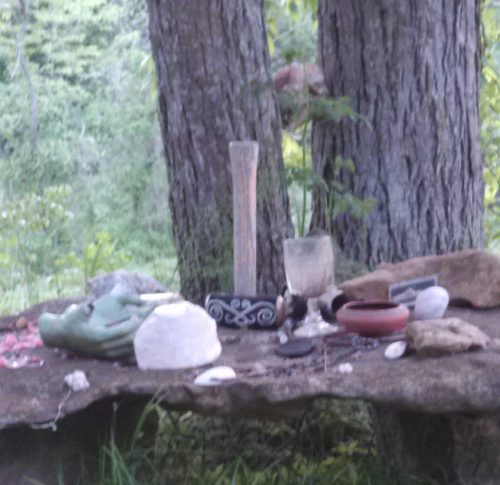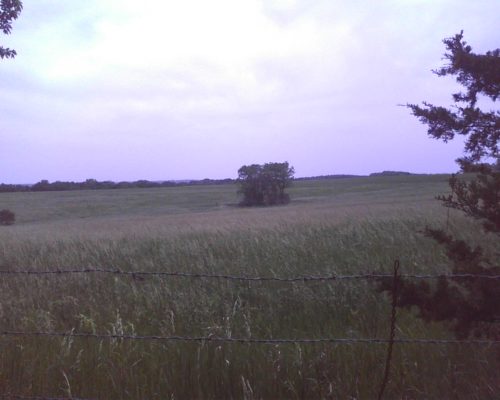![]()
I have been thinking about land and sacredness, about the idea that we can choose a spot on a survey map and declare it sacred ground. My thoughts are grounded in the Gaea Retreat, the Pagan nature center in Kansas where I most often make my pilgrimages, but thinking about that particular place leads me to think about places like it more generally. What does it mean to call a place “sacred?” What does that mean for our relationship to it? And how do our religious, spiritual, and magickal conceptions of a place sit alongside the legal and social borders of the location? I know from being there, from doing magick there, that Gaea has a sacred energy to it, that it is a place worthy of pilgrimage; but I also want to know how it came to be that way, and why we choose to interact with a sacred landscape in the way we do.

An altar at Gaea Retreat [E. Scott].
Gaea’s land, at the fundamental level, is not special by the standards of its surrounding landscapes; it has much the same qualities as any of the surrounding farmland in eastern Kansas. Most of the dirt is bog-standard Rosendale and Bendena silty clay loam, a soil series the USDA calls “very shallow and somewhat excessively drained.” Drive two miles in either direction down the gravel road outside of Gaea’s gates and you will find cattle farms and wheat fields. The average annual precipitation is 91 centimeters (most of which seems to fall on the Saturday night of the Heartland Pagan Festival.) Not long ago, within my memory, it stood apart from urban life —Jarbalo, the closest town, is so small that it closed its post office in 1958 — but the suburban strip mall character of the Kansas City exurbs has begun to creep closer and closer to Gaea’s boundaries. Perhaps someday soon the city’s sprawl will consume Gaea, too, but for now it maintains its distance.
Was this land sacred before we bought it? I don’t know. The Kansa, the indigenous people who traditionally lived in the area around Gaea, were driven out by smallpox, floods, unscrupulous land deals, and finally Indian removal, ending up in Oklahoma, where now no one speaks Kansa language as a first language. How the Kansa felt about this patch of land, whether it spoke to them in some way similar to how it speaks to me, I can’t say.
Before Gaea was Gaea, it belonged to a Baptist church; it had been used as a Bible campground since the 1950s. Perhaps this speaks to it having a numinous quality that preexisted our arrival. According to an article in the Leavenworth Times newspaper, before the Baptists owned Gaea, it had been used as a 1940s-era nudist camp – a fact that apparently none of the original investors in the modern camp knew. I don’t find the existence of such a camp surprising, in and of itself — such naturalist communities exist all over, hidden in the country’s back corners — but the idea that, just by coincidence, two different sorts of “naturalists,” both frequently disdaining clothes, happened to build camps on the same site strikes me as an unlikely bit of synchronicity. Although I worship the wights who inhabit particular landscapes, I’ve always felt uneasy about asserting the idea that those spirits “exist” outside of my personal metaphors; I believe, but belief is only a way to speak something unspeakable. It is too easy to see a perfect coincidence and declare it magick. I distrust perfect things, but this particular coincidence does give me doubt about my doubts.

Trees beyond the borders of Gaea [E. Scott].
(There is a copse of trees in the middle of a field in the cattle ranch next door to Gaea; I see it whenever I stand on Gaea’s western edge, near the place I camp. This copse strikes me as a holy place, and if given the opportunity, I would give sacrifices of wine and incense to its resident spirits, but there is a barbed-wire fence between myself and that field. The fence is a legal fiction; there is no difference, really, between the dirt on one side of the fence and the dirt beyond, but the legal fiction could get me shot, and so I do not give my offerings to the land wights in that stand of trees.)
Here we have 168 acres of land, demarcated by our practice, devotion, and stewardship, and also by our nonprofit status and our ability to placate the local government into allowing our community to continue to exist. Once, in the early ’00s, a local government board did in fact retract that permit: the Leavenworth County Planning Commission voted to bar Gaea from operating as a campground, citing concerns about nudity and loose morals on the property. Though Gaea won the fight to continue its operations, even now, more than 15 years later, Earth Rising remains guarded about anything that could draw negative attention to Gaea for fear of a hostile bureaucrat bringing Gaea and its community of witches, nudists, and queer folks to an end.
In the way that a set of cross-hatched lines can seem to make up a face, the rules of a society can seem to make up our lives; they are the lines in which we are drawn. The surveyor’s office draws us in lines of property on real estate maps. The county commissioner’s office draws us in lines of legal text and meeting minutes. The norms of our society draw us in lines of gender identity, racial coding, sexual ethics. The past draws us in lines of lineage, land-use, and colonial legacy. Our lives are drawn with this set of pen and ink; it is within the lines they draw that we try our best to be free.
* * *
The views and opinions expressed by our diverse panel of columnists and guest writers represent the many diverging perspectives held within the global Pagan, Heathen and polytheist communities, but do not necessarily reflect the views of The Wild Hunt Inc. or its management.
The Wild Hunt is not responsible for links to external content.
To join a conversation on this post:
Visit our The Wild Hunt subreddit! Point your favorite browser to https://www.reddit.com/r/The_Wild_Hunt_News/, then click “JOIN”. Make sure to click the bell, too, to be notified of new articles posted to our subreddit.